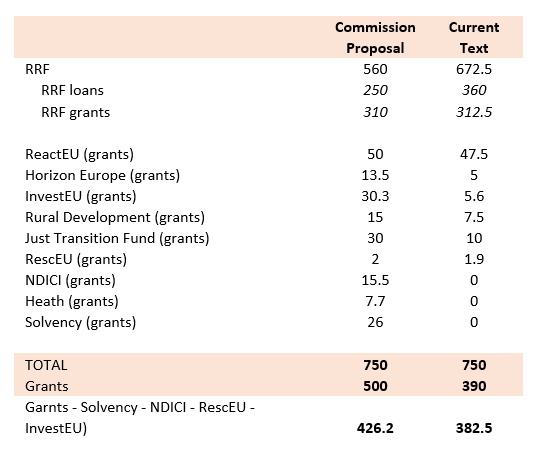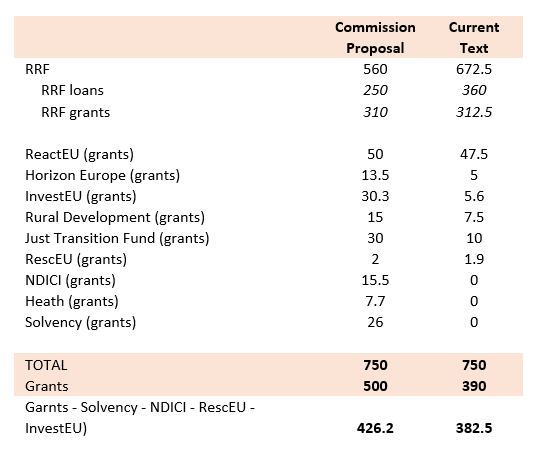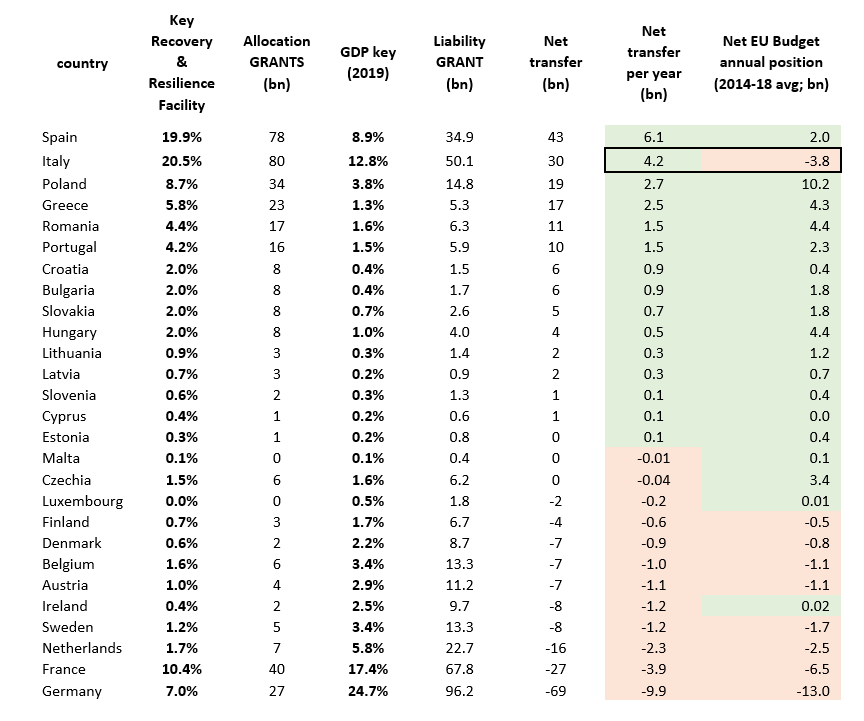The total amount of funds available under #NextGenerationEU remains 750bn as in the original EC proposal, but the composition changes: grants fall from 500bn to 390bn while loans increase from 250bn to EUR 360bn. But the composition of cuts matter 2/
HorizonEU (research), cut by 62%; InvestEU cut by more than 80%; Just Transition Fund slashed by 2 thirds; 3 programs completely de-funded, among which Solvency Instrument, that could have allowed for EU-level solvency aid to firms in countries that could not afford it 4/
National allocations of grants remain in line with what I had shared earlier. Applying the EC’s RRF key across the whole 390 bn (as a simpification),  https://abs.twimg.com/emoji/v2/... draggable="false" alt="🇮🇹" title="Flagge von Italien" aria-label="Emoji: Flagge von Italien"> still gets around 30 bn in net fiscal transfers, equivalent to returned ~7 years of net contributions into the EU budget
https://abs.twimg.com/emoji/v2/... draggable="false" alt="🇮🇹" title="Flagge von Italien" aria-label="Emoji: Flagge von Italien"> still gets around 30 bn in net fiscal transfers, equivalent to returned ~7 years of net contributions into the EU budget  https://abs.twimg.com/emoji/v2/... draggable="false" alt="⬇️" title="Pfeil nach unten" aria-label="Emoji: Pfeil nach unten">5/
https://abs.twimg.com/emoji/v2/... draggable="false" alt="⬇️" title="Pfeil nach unten" aria-label="Emoji: Pfeil nach unten">5/
Conditionality: countries will need to start paying attention to the EC& #39;s country-specific recommendations (CSR), as that will be the benchmark against which national spending plans will be assessed under #NextGenerationEU. That means structural reforms. 6/
Governance: EC& #39;s assessment of plans needs approval by Council at qualified majority (QMV, 15 countries for at least 65% of population), in 4 weeks. Fortunately  https://abs.twimg.com/emoji/v2/... draggable="false" alt="🇳🇱" title="Flagge der Niederlande" aria-label="Emoji: Flagge der Niederlande"> call for veto did not go through: veto on plan + CSR would have made this look very much like an ESM programme. 7/
https://abs.twimg.com/emoji/v2/... draggable="false" alt="🇳🇱" title="Flagge der Niederlande" aria-label="Emoji: Flagge der Niederlande"> call for veto did not go through: veto on plan + CSR would have made this look very much like an ESM programme. 7/
Disbursements is where emergency brake comes in. The assessment of milestones achievement is done by EC, but in "exceptional" cases 1 or more members can ask for referral to the Council if they consider that there are "serious deviations from the satisfactory fulfilment". 8/
This gives to some the chance to slow down disbursement process, but not to stop it, as ultimately the Commission prevails (as outlined by the sentence: "process will be in line with Article 17 TEU and Article 317 TFEU"). We dodged a bullet and Rutte can spin this electorally. 9/
Rebates:  https://abs.twimg.com/emoji/v2/... draggable="false" alt="🇳🇱" title="Flagge der Niederlande" aria-label="Emoji: Flagge der Niederlande">
https://abs.twimg.com/emoji/v2/... draggable="false" alt="🇳🇱" title="Flagge der Niederlande" aria-label="Emoji: Flagge der Niederlande"> https://abs.twimg.com/emoji/v2/... draggable="false" alt="🇦🇹" title="Flagge von Österreich" aria-label="Emoji: Flagge von Österreich">
https://abs.twimg.com/emoji/v2/... draggable="false" alt="🇦🇹" title="Flagge von Österreich" aria-label="Emoji: Flagge von Österreich"> https://abs.twimg.com/emoji/v2/... draggable="false" alt="🇸🇪" title="Flagge von Schweden" aria-label="Emoji: Flagge von Schweden">
https://abs.twimg.com/emoji/v2/... draggable="false" alt="🇸🇪" title="Flagge von Schweden" aria-label="Emoji: Flagge von Schweden"> https://abs.twimg.com/emoji/v2/... draggable="false" alt="🇩🇰" title="Flagge von Dänemark" aria-label="Emoji: Flagge von Dänemark">and all get increased rebates. Per year they will get: 1.9 bn for
https://abs.twimg.com/emoji/v2/... draggable="false" alt="🇩🇰" title="Flagge von Dänemark" aria-label="Emoji: Flagge von Dänemark">and all get increased rebates. Per year they will get: 1.9 bn for  https://abs.twimg.com/emoji/v2/... draggable="false" alt="🇳🇱" title="Flagge der Niederlande" aria-label="Emoji: Flagge der Niederlande">, 1.1 bn for
https://abs.twimg.com/emoji/v2/... draggable="false" alt="🇳🇱" title="Flagge der Niederlande" aria-label="Emoji: Flagge der Niederlande">, 1.1 bn for  https://abs.twimg.com/emoji/v2/... draggable="false" alt="🇸🇪" title="Flagge von Schweden" aria-label="Emoji: Flagge von Schweden">, 565 mn for
https://abs.twimg.com/emoji/v2/... draggable="false" alt="🇸🇪" title="Flagge von Schweden" aria-label="Emoji: Flagge von Schweden">, 565 mn for  https://abs.twimg.com/emoji/v2/... draggable="false" alt="🇦🇹" title="Flagge von Österreich" aria-label="Emoji: Flagge von Österreich">, 377 mn for
https://abs.twimg.com/emoji/v2/... draggable="false" alt="🇦🇹" title="Flagge von Österreich" aria-label="Emoji: Flagge von Österreich">, 377 mn for  https://abs.twimg.com/emoji/v2/... draggable="false" alt="🇩🇰" title="Flagge von Dänemark" aria-label="Emoji: Flagge von Dänemark">. The German rebate is unchanged at 3.7 bn per year. Rebates total around 53 bn over the seven-year budget period. who pays? 10/
https://abs.twimg.com/emoji/v2/... draggable="false" alt="🇩🇰" title="Flagge von Dänemark" aria-label="Emoji: Flagge von Dänemark">. The German rebate is unchanged at 3.7 bn per year. Rebates total around 53 bn over the seven-year budget period. who pays? 10/
In the past,  https://abs.twimg.com/emoji/v2/... draggable="false" alt="🇫🇷" title="Flagge von Frankreich" aria-label="Emoji: Flagge von Frankreich">
https://abs.twimg.com/emoji/v2/... draggable="false" alt="🇫🇷" title="Flagge von Frankreich" aria-label="Emoji: Flagge von Frankreich">  https://abs.twimg.com/emoji/v2/... draggable="false" alt="🇮🇹" title="Flagge von Italien" aria-label="Emoji: Flagge von Italien"> and
https://abs.twimg.com/emoji/v2/... draggable="false" alt="🇮🇹" title="Flagge von Italien" aria-label="Emoji: Flagge von Italien"> and  https://abs.twimg.com/emoji/v2/... draggable="false" alt="🇪🇸" title="Flagge von Spanien" aria-label="Emoji: Flagge von Spanien"> have been paying respectively 30%, 22% and 15% of all rebates. If this stays the same,
https://abs.twimg.com/emoji/v2/... draggable="false" alt="🇪🇸" title="Flagge von Spanien" aria-label="Emoji: Flagge von Spanien"> have been paying respectively 30%, 22% and 15% of all rebates. If this stays the same,  https://abs.twimg.com/emoji/v2/... draggable="false" alt="🇫🇷" title="Flagge von Frankreich" aria-label="Emoji: Flagge von Frankreich">would be liable for ~16 bn (~2bn per year);
https://abs.twimg.com/emoji/v2/... draggable="false" alt="🇫🇷" title="Flagge von Frankreich" aria-label="Emoji: Flagge von Frankreich">would be liable for ~16 bn (~2bn per year);  https://abs.twimg.com/emoji/v2/... draggable="false" alt="🇮🇹" title="Flagge von Italien" aria-label="Emoji: Flagge von Italien"> for ~11bn (~1.6 per year);
https://abs.twimg.com/emoji/v2/... draggable="false" alt="🇮🇹" title="Flagge von Italien" aria-label="Emoji: Flagge von Italien"> for ~11bn (~1.6 per year);  https://abs.twimg.com/emoji/v2/... draggable="false" alt="🇪🇸" title="Flagge von Spanien" aria-label="Emoji: Flagge von Spanien"> for ~8bn (~1.1bn per year). For
https://abs.twimg.com/emoji/v2/... draggable="false" alt="🇪🇸" title="Flagge von Spanien" aria-label="Emoji: Flagge von Spanien"> for ~8bn (~1.1bn per year). For  https://abs.twimg.com/emoji/v2/... draggable="false" alt="🇪🇸" title="Flagge von Spanien" aria-label="Emoji: Flagge von Spanien"> and
https://abs.twimg.com/emoji/v2/... draggable="false" alt="🇪🇸" title="Flagge von Spanien" aria-label="Emoji: Flagge von Spanien"> and  https://abs.twimg.com/emoji/v2/... draggable="false" alt="🇮🇹" title="Flagge von Italien" aria-label="Emoji: Flagge von Italien"> this lower the net fiscal transfer effect 11/
https://abs.twimg.com/emoji/v2/... draggable="false" alt="🇮🇹" title="Flagge von Italien" aria-label="Emoji: Flagge von Italien"> this lower the net fiscal transfer effect 11/
Conclusion:
This remains a positive steps for https://abs.twimg.com/emoji/v2/... draggable="false" alt="🇪🇺" title="Flagge der Europäischen Union" aria-label="Emoji: Flagge der Europäischen Union">integration because it overcomes 2 historic taboos: (i) opposition to large size common issuance; (ii) opposition to explicit fiscal transfers (even if temporary). 12/
https://abs.twimg.com/emoji/v2/... draggable="false" alt="🇪🇺" title="Flagge der Europäischen Union" aria-label="Emoji: Flagge der Europäischen Union">integration because it overcomes 2 historic taboos: (i) opposition to large size common issuance; (ii) opposition to explicit fiscal transfers (even if temporary). 12/
This remains a positive steps for
Conclusion:
However it comes at a cost. First, the increase in rebates perpetuates and worsens a problem that we know from before this MFF. In particular, Germany could have accepted a decrease in its rebate to compensate for the frugals& #39; demands but did not. 13/
However it comes at a cost. First, the increase in rebates perpetuates and worsens a problem that we know from before this MFF. In particular, Germany could have accepted a decrease in its rebate to compensate for the frugals& #39; demands but did not. 13/
Conclusion:
Second, the cuts to grants are concentrated on programs that would have paid for genuine EU-level public goods and hence could have help create a bridge from #NextGenerationEU towards something permanent and federal. This is a negative for the longer term imho 14/
Second, the cuts to grants are concentrated on programs that would have paid for genuine EU-level public goods and hence could have help create a bridge from #NextGenerationEU towards something permanent and federal. This is a negative for the longer term imho 14/
Overall, given where we were in March and where this #EUCO had started, this is certainly a positive and major development. At the same time, there are shadows that probably make it less ambitious (especially over a long-term integration horizon) than initially expected. end/

 Read on Twitter
Read on Twitter Here is a comparison of program allocations as per the original proposal and the current deal. While the grants in the Recovery Fund (RRF) has been preserved, the cut in grants has concentrated on programmes that would have financed truly European public goods. 3/" title="https://abs.twimg.com/emoji/v2/... draggable="false" alt="⬇️" title="Pfeil nach unten" aria-label="Emoji: Pfeil nach unten">Here is a comparison of program allocations as per the original proposal and the current deal. While the grants in the Recovery Fund (RRF) has been preserved, the cut in grants has concentrated on programmes that would have financed truly European public goods. 3/" class="img-responsive" style="max-width:100%;"/>
Here is a comparison of program allocations as per the original proposal and the current deal. While the grants in the Recovery Fund (RRF) has been preserved, the cut in grants has concentrated on programmes that would have financed truly European public goods. 3/" title="https://abs.twimg.com/emoji/v2/... draggable="false" alt="⬇️" title="Pfeil nach unten" aria-label="Emoji: Pfeil nach unten">Here is a comparison of program allocations as per the original proposal and the current deal. While the grants in the Recovery Fund (RRF) has been preserved, the cut in grants has concentrated on programmes that would have financed truly European public goods. 3/" class="img-responsive" style="max-width:100%;"/>

 still gets around 30 bn in net fiscal transfers, equivalent to returned ~7 years of net contributions into the EU budget https://abs.twimg.com/emoji/v2/... draggable="false" alt="⬇️" title="Pfeil nach unten" aria-label="Emoji: Pfeil nach unten">5/" title="National allocations of grants remain in line with what I had shared earlier. Applying the EC’s RRF key across the whole 390 bn (as a simpification), https://abs.twimg.com/emoji/v2/... draggable="false" alt="🇮🇹" title="Flagge von Italien" aria-label="Emoji: Flagge von Italien"> still gets around 30 bn in net fiscal transfers, equivalent to returned ~7 years of net contributions into the EU budget https://abs.twimg.com/emoji/v2/... draggable="false" alt="⬇️" title="Pfeil nach unten" aria-label="Emoji: Pfeil nach unten">5/" class="img-responsive" style="max-width:100%;"/>
still gets around 30 bn in net fiscal transfers, equivalent to returned ~7 years of net contributions into the EU budget https://abs.twimg.com/emoji/v2/... draggable="false" alt="⬇️" title="Pfeil nach unten" aria-label="Emoji: Pfeil nach unten">5/" title="National allocations of grants remain in line with what I had shared earlier. Applying the EC’s RRF key across the whole 390 bn (as a simpification), https://abs.twimg.com/emoji/v2/... draggable="false" alt="🇮🇹" title="Flagge von Italien" aria-label="Emoji: Flagge von Italien"> still gets around 30 bn in net fiscal transfers, equivalent to returned ~7 years of net contributions into the EU budget https://abs.twimg.com/emoji/v2/... draggable="false" alt="⬇️" title="Pfeil nach unten" aria-label="Emoji: Pfeil nach unten">5/" class="img-responsive" style="max-width:100%;"/>


